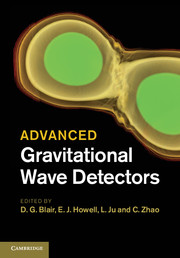Book contents
- Frontmatter
- Contents
- List of contributors
- Foreword
- Preface
- Introduction
- Part 1 An introduction to gravitational wave astronomy and detectors
- 1 Gravitational waves
- 2 Sources of gravitational waves
- 3 Gravitational wave detectors
- 4 Gravitational wave data analysis
- 5 Network analysis and multi-messenger astronomy
- Part 2 Current laser interferometer detectors – three case studies
- Part 3 Technology for advanced gravitational wave detectors
- Part 4 Technology for third generation gravitational wave detectors
- Index
5 - Network analysis and multi-messenger astronomy
from Part 1 - An introduction to gravitational wave astronomy and detectors
Published online by Cambridge University Press: 05 March 2012
- Frontmatter
- Contents
- List of contributors
- Foreword
- Preface
- Introduction
- Part 1 An introduction to gravitational wave astronomy and detectors
- 1 Gravitational waves
- 2 Sources of gravitational waves
- 3 Gravitational wave detectors
- 4 Gravitational wave data analysis
- 5 Network analysis and multi-messenger astronomy
- Part 2 Current laser interferometer detectors – three case studies
- Part 3 Technology for advanced gravitational wave detectors
- Part 4 Technology for third generation gravitational wave detectors
- Index
Summary
The data from widely spaced networks of gravitational wave detectors can be combined to act as a single detector with optimum sensitivity and directional resolution. We first provide a basic mathematical framework and characterise the detection capacity and relative performance of various networks. A systematic approach is then provided for the construction of network detection statistics, stable waveform extraction, null-stream construction, and source localisation. At the end, wediscuss the angular resolution of an arbitrary detector network and issues relevant to the field of multi-messenger gravitational wave astronomy.
Introduction
As discussed in the previous chapters, several large-scale interferometric gravitational wave (GW) detectors have reached or exceeded their design sensitivity, and have been coordinating to operate as a global array. These include the LIGO detectors at Louisiana and Washington states of the USA, the Virgo detector in Italy and the GEO600 detector in Germany. The three US-based interferometric GW detectors LIGO have completed their ground-breaking fifth science run in November 2007. An integrated full year's worth of data has been accumulated with all three interferometers in coincidence. Advanced LIGO will enable a 10-fold improvement in sensitivity, allowing detectors to monitor a volume of the Universe 1000 times larger than can be achieved by current detectors. These advanced detectors are predicted to detect tens to hundreds of events per year (see Abadie et al., 2010). The detection of the first GW signal is virtually assured with Advanced LIGO.
- Type
- Chapter
- Information
- Advanced Gravitational Wave Detectors , pp. 89 - 110Publisher: Cambridge University PressPrint publication year: 2012
- 2
- Cited by



